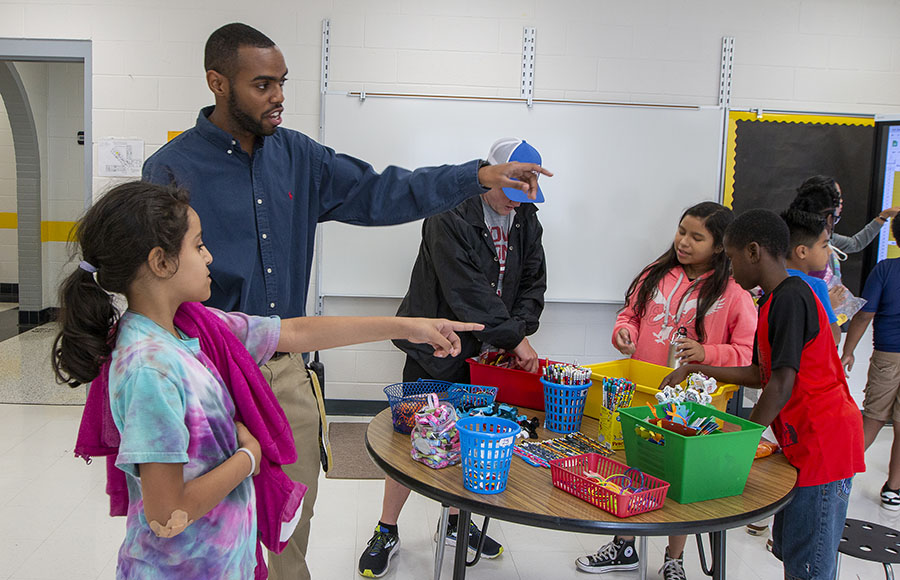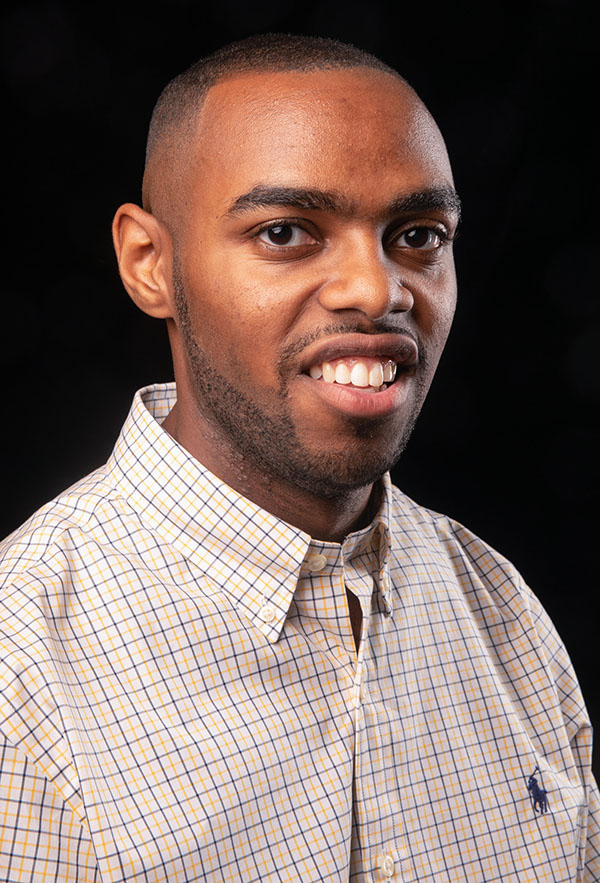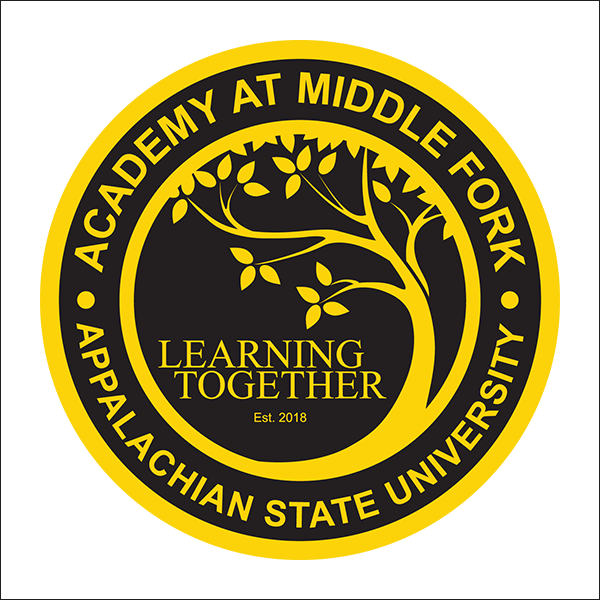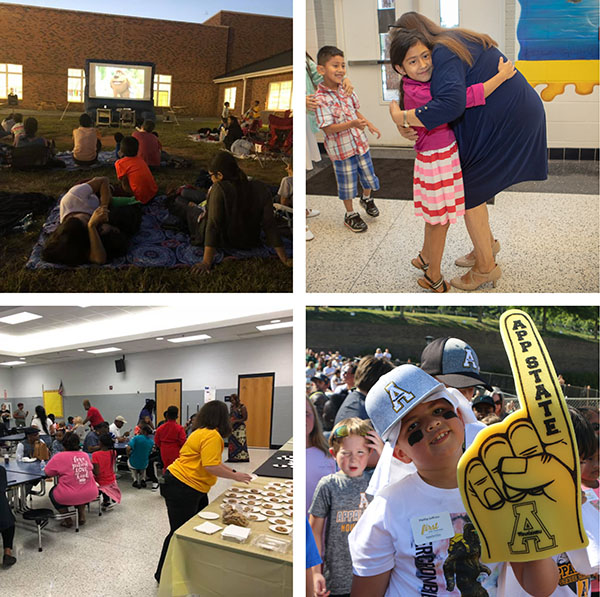BOONE, N.C. — At the Appalachian State University Academy at Middle Fork, students in grades K–5 earn Mountaineer tokens for exhibiting honesty, integrity, kindness and excellence (HIKE) — then redeem their tokens at a trading post for school supplies, treats and Appalachian gear.
Darron Daniels, the school’s behavioral support coach, collaborates with teachers to identify students with high-level needs — those who have had frequent visits to the office for behavior issues. “I establish relationships with these students, become the person they come to talk to if they’re having issues and communicate strategies with them,” Daniels explained.
In-school suspension has been replaced by a “Care and Hope” room, where students are given the opportunity to de-escalate and manage their feelings.
It appears the school’s positive reinforcement is working: “Our referral and suspension rate at the academy decreased by 49% during the 2018–19 academic year,” Daniels said. “I tell the kids to be the best they can be. I put incentives in place for them to be successful in the classroom and stay out of trouble.”
Daniels is one of 45 academy faculty and staff members committed to the school’s success as part of the University of North Carolina Laboratory School initiative established to provide enhanced educational programming to students in low-performing schools and to plan demonstration sites for the preparation of future teachers and school administrators.
The path to education
Daniels, currently enrolled in Appalachian’s educational media graduate degree program, graduated from Elon University in 2016 with a B.A. in strategic communications with a minor in criminal justice. Discussions in his criminal justice studies inspired him to pursue a career in education, he said.
“Topics such as how inequities in education influence the school-to-prison pipeline made me realize how elementary and middle school is a pivotal time to address the needs of students and provide intervention that can break cycles,” Daniels said.
Through one of his criminal justice classes, Daniels was recruited to work as a mentor in an elementary school as part of the Men of Character Mentoring Program — an initiative designed to increase the academic and social success of black males in elementary school. He also began serving as a tutor with the Boys and Girls Clubs of America.
Daniels said he saw a positive change in the behavior and academic performance of schoolchildren when they had a caring adult tutor them and take an interest in their lives.
“I wasn’t just helping the students in their studies; I was talking to them about making positive choices in their lives and congratulating them when they did well. That experience influenced me into what I’m doing today,” he shared.
Daniels has been with the academy since 2017, when it operated as Middle Fork Elementary in the Winston-Salem/Forsyth County Schools (WS/FCS) district. In 2018, the Reich College of Education at Appalachian partnered with WS/FCS to establish the Academy at Middle Fork.
Driven by passion
Daniels also serves as the academy’s director of student affairs and emergency management, a role that affords him the opportunity to interact with almost everyone at the school. Increased exposure to the students and their families has strengthened his initial role, he said.
Daniels enrolled in Appalachian’s graduate program as part of the continuing education program offered to teachers at the academy.
“As I explored Appalachian’s graduate school website, I looked for what I’m passionate about and how I can combine my interests with what’s next. Building on my strategic communications undergraduate degree, I saw the educational media program as something that will help me use technology to support students academically, socially, emotionally and behaviorally,” Daniels said.
“I’ve just started in the program this semester, but already my classes have opened my mind to new ways technology can be used to support students,” he added.
“Everyone at Appalachian has been so supportive and has contributed to the success we’ve had at the academy,” Daniels said. “We can feel the difference Appalachian has made in this school, in the lives of the students and in the teachers and staff.”
What do you think?
Share your feedback on this story.
About the Academy at Middle Fork
The Appalachian State University Academy at Middle Fork, located in Walkertown, North Carolina, serves approximately 300 K–5 students. The academy provides a balanced education through the implementation of research-based practices, state-of-the-art literacy instruction, and exemplary classroom instruction and administration. Learn more at https://middlefork.appstate.edu.
About the Reich College of Education
Appalachian State University offers one of the largest undergraduate teacher preparation programs in North Carolina, graduating about 500 teachers a year. The Reich College of Education enrolls more than 2,000 students in its bachelor’s, master’s, education specialist and doctoral degree programs, with offerings that span multiple fields — from teacher preparation, counseling, and therapy, to higher education, school and student affairs administration, library science, educational leadership and more. With over 10,000 alumni employed in North Carolina public schools, there is at least one Reich College graduate in every county in the state. Learn more at https://rcoe.appstate.edu.
About graduate education at App State
Appalachian State University’s Williams School of Graduate Studies helps individuals reach the next level in their career advancement and preparedness. The school offers 80 graduate degree and certificate programs — both in person and online — in a range of disciplines, including doctoral programs in education (Ed.D.) and psychology (Psy.D.). The graduate school enrolls nearly 2,000 students. Learn more at https://graduate.appstate.edu.
About Appalachian State University
As a premier public institution, Appalachian State University prepares students to lead purposeful lives. App State is one of 17 campuses in the University of North Carolina System, with a national reputation for innovative teaching and opening access to a high-quality, cost-effective education. The university enrolls more than 21,000 students, has a low student-to-faculty ratio and offers more than 150 undergraduate and 80 graduate majors at its Boone and Hickory campuses and through App State Online. Learn more at https://www.appstate.edu.








![How NCInnovation Is Rethinking Economic Development in North Carolina [faculty featured]](/_images/_posts/2026/02/rethinking-economic-development-600x400.jpg)







